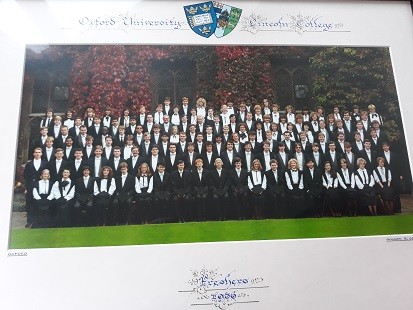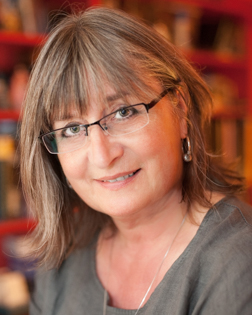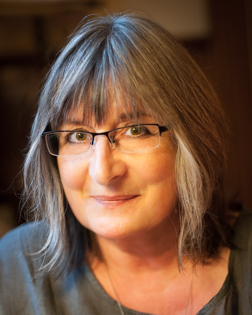At 16, I was odd and rebellious. I left school and worked in the local supermarket, then in various shops and cafes. A succession of bereavements during my teens triggered a serious breakdown aged 21 (this was in 1982). I had to detach myself from my family as part of the recovery process. As I went through psychotherapy, and began to recover, I started an English Literature A level at evening classes. My studies went so well that within three years I’d got three grade As and won a place to study English at Oxford University. One day perhaps I’ll tell the whole story of those years, but not just yet.
I still feel that getting in to Oxford was probably my biggest achievement, because of how I started out. I had no idea of the privilege I’d competed with to get in. I was penniless – so broke that I had to sell my A level textbooks to pay for the petrol for a friend to drive me there! I arrived with £20 in my pocket, and nothing at all in the bank, so thank goodness there was a grant cheque waiting for me.

You can see me in the formal matriculation photo: I’m second from the left at the front, with spiky hair and second-hand clothes – and a slightly shell-shocked expression!
As a mature student with no family support, I was very much in the minority at university. I was often hungry. The grant wasn’t enough to live on and I worked in cafes and the local independent cinemas all the way through my undergraduate degree. But I loved my college, the beautiful buildings, amazing libraries, and brilliant tutors. I won academic prizes, got a First Class degree, and moved back to bohemian Bristol.
In Bristol, I got my dream job in publishing and learned the full range of editorial skills, from proof-reading and copy-editing to writing articles, picture research, captions and so on. After two years I went back to Oxford to do my PhD. Again, I worked throughout my studies, but this time I was able to take on freelance editing and writing, and undergraduate tutoring, so I was building up my professional skills and experience alongside my studies.
By the time I finished my PhD I was in my mid-30s and I moved back to Bristol. I worked for a few years at Bristol University in External Relations, which drew heavily on my publishing experience, but I was also learning new things – organising events, and writing bids and proposals to funding bodies and corporate sponsors.
After a few years, I went freelance as an editorial consultant, and for the first time made a good living from my professional skills. I got all of my work through recommendations and word of mouth. It felt great! I was doing work that I loved, and developing my skills all the time. As well as all the editorial work, I devised and ran training workshops for new academics at both Bath and Bristol universities on “writing for publication”, as well as a two-day market intelligence training workshop for BT’s HE sales team.
In 2000, I had my son, and although he was healthy and happy, I developed serious heart problems. I had to give up my freelance work while I recovered, which took a few years. To keep my mind active, I revised and published my thesis. I’d finally published a book!
Ever since then, I have worked as a freelance editor alongside other jobs in schools and universities. I’ve also been a freelance tutor, specialising in supporting dyslexic students with their study skills, and with presenting and organising their Master’s dissertations. For the last year, I’ve supported a trainee nurse through her Foundation degree. She’s a wonderful person, whose dyslexia was only just diagnosed after she started her studies. I loved working with her and am very happy that she’s now completed her course and moved up two grades to her dream job.
So as my understanding of the new business landscape has evolved, I’ve developed the idea of bringing together my skills to help dyslexic business owners with their written projects (posts and blogs for social media, reports and executive summaries, etc).
This business idea is something I am genuinely committed to. I have personal experience (as a parent) of living with neurodiversity. My son had all sorts of problems from the moment he entered the education system. He was 9 years old before I finally got the professionals to listen properly, and once I got him in front of a paediatrician he was very quickly diagnosed with Asperger’s Syndrome. He’s doing really well now, but I’ve had to fight for every scrap of support for him.
Like dyslexia, autism is part of a range of what are known as “Specific Learning Difficulties” (SpLDs), which includes ADHD, ADD and other conditions. Another, more general term for this, is “neurodiversity” – which just a way of describing brains that process information differently to a “neurotypical” brain.
Frankly, I don’t have the emotional resources to apply what I’ve learned as an SEN parent to supporting others with autism. But I do have the skills, experience, and the personal commitment, to do something meaningful for people living with dyslexia.
In my last job (at Bath Spa University), I learned a lot about the ways that students with dyslexia are taught and assessed differently in the School of Art and Design. On average, about 80% of their students have dyslexia. So do a significant proportion of the staff. In the School of Art and Design, dyslexia is seen as a source of creativity and innovation, and not the impediment it becomes if you try to assess someone on a set of skills they don’t have.
Ever since I first graduated, I’ve always worked in publishing, education or training, in one way or another. It is all founded in reading and writing, and without those two skills – or with a difference that makes those skills very hard to acquire – people are hugely disadvantaged.
For me, the education system worked well. I think in linear ways, I read easily and quickly, and love it, and I write fluently. But it is not for everyone. So my business idea is to provide writing and editing services specifically tailored for business owners with dyslexia.
I have the understanding, the skills and a very personal commitment to working with people living with neurodiversity.
Ironically, perhaps, many dyslexic people will find it extremely hard to read this article, so I know I need to find other ways of marketing my offer to them. This is my authentic voice, but I want to tell my story in ways which are easy to read and accessible.
So one of my current projects is a series of short posts on Inclusive Writing Practice, which I hope will help to raise awareness of the ways that non-dyslexic people can write in ways which help neurodiverse readers. There are some fairly simple things we can do to make our writing more accessible. I’ll be posting about those ideas over the next few weeks.
Watch this space!
Gillian Austen






